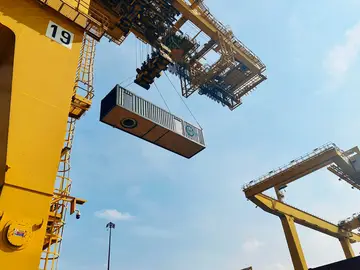One year, many milestones: Carbo-FORCE pyrolysis plants in demand worldwide
Kassel, Germany– Joining forces to address climate change: With this goal in mind, Carbo-FORCE and Bauer Resources became partners in early 2023. Today, roughly one year after the start of the partnership, the results are plain to see: After projects in Osterrade and Grosssolt, this groundbreaking plants for the carbonization of biomass also traveled to Dubai. Every project is a true success story, but some are particularly impressive. Whether because of a special award or an unusual field of application.
Simply excellent
Not just revolutionary, but also award-winning: in fall 2023, Carbo-FORCE plant was installed for a farmer in Osterrade, northern Germany. In the future, this will convert roughly 2,000 t of wood chips from the region into approximately 500 t of biochar every year. “This can then be used as a healthy feed additive for the 300 cows on his farm,” explains Nico Freyermuth, Product Manager at Carbo-FORCE. The exhaust heat generated during production will be fed into a local heat network, and the 1,500 t of sequestered CO2 per year will be traded as carbon credits. In this way, the carbonization plant not only helps to mitigate climate change, but also provides the farmer with new sources of income. And it gets even better: With his Carbo-FORCE plant, the client actually won the renowned VR Sponsorship Award – the most valuable award for agriculture in all of Germany. Carbo-FORCE also implemented a similar project in Grosssolt very recently.
Camel dung, seriously?
At first it might sound crazy to say that valuable biochar can be produced from camel dung. But as the specialists from Carbo-FORCE are currently demonstrating with a partner in Dubai, it’s absolutely possible. A CF-250 unit is in use there on a dairy farm with 8,500 camels. “By carrying out this practical test with our partner, we want to obtain important findings about the use of camel dung as an input material and optimize plant handling,” explains Kai Alberding, Managing Director of Carbo-FORCE. Before the camel manure can be processed, it has to be separated out from impurities such as sand and then dried in the sun for one to two days. And what was the result? “Impressive! Roughly 40% of the carbon can be bound in the biochar that is produced. So if the entire volume of dung, approximately 30,600 t, were converted into biochar, the plantwould be able to bind roughly 13,800 t of CO2 every year,” underscores Kai Alberding. There is enormous potential here, as well as various possible applications. For instance, the biochar can be used for soil improvement in the barren desert to help with revegetation and recovery. Furthermore, energy is produced during the carbonization process in the form of heat, which will be used to cover part of the camel farm’s energy supply. In this way, the innovative Carbo-FORCE plant plays a key role in achieving climate targets. For that reason, it was also recently presented at the COP28 climate conference in Dubai.
A success story without borders
These impressive projects demonstrate the versatility and enormous potential of innovative Carbo-FORCE plants. “We have already sold a lot of plants for 2024,” reports Kai Alberding. And that's far from all. The plan is to continue the success story with further international expansion. In a nutshell: There’s no doubt that Carbo-FORCE is just beginning its global success story.
Press Image
Download
Your Contact
Specialized press Resources, Redevelopment, Environment
